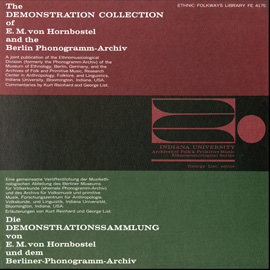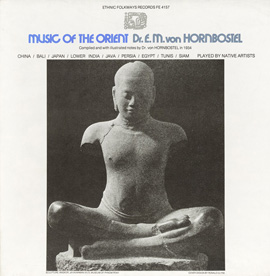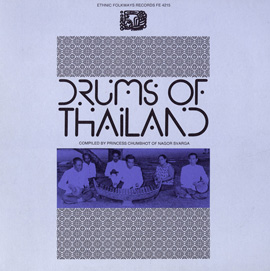Summary
The piece “Man and Buffalo (Kon Gap Kwai)” by Caravan was instrumental in affecting governmental and social change in Thailand. Musical study of the song lends itself to discussions of form, performances of ostinati and accompaniment, and improvisation of a pentatonic song/solo.
Suggested Grade Levels: 6-8, 9-12
Country: Thailand
Region: Southeast Asia
Culture Group: Thai
Genre: Protest Songs
Instruments: Drums, Percussion, Guitar
Language: Thai
Co-Curricular Areas: Social Studies
National Standards: 2, 3, 6, 9
Prerequisites: None
Objectives:
- Listen to and identify instruments, chord changes, rhythm, form, texture, timbres
- Play ostinati and accompaniment
- Improvise rhythms and a pentatonic solo
- Discover music’s role in the Thai reform movement of the mid-20th century
Material:
- “Man and Buffalo (Kon Gap Kwai)” by Caravan from Thailand: Caravan: Songs for Life, (PAR01042)
- Liner notes to Thailand: Caravan: Songs for Life (PAR01042)
- “Thailand: Admiration of a Sleeping Maiden” from Music of Southeast Asia, (FW04423)
- Map of Asia and Thailand
- Bass xylophone
Lesson Segments:
- Form (National Standards 6, 9)
- Culture (National Standard 9)
- Perform on Percussion (National Standards 2, 3, 6)
- Perform on Guitar (National Standards 2, 6)
- Perform on Orff (National Standards 2, 3, 6, 9)
1. Form: “Man and Buffalo (Kon Gap Kwai)”
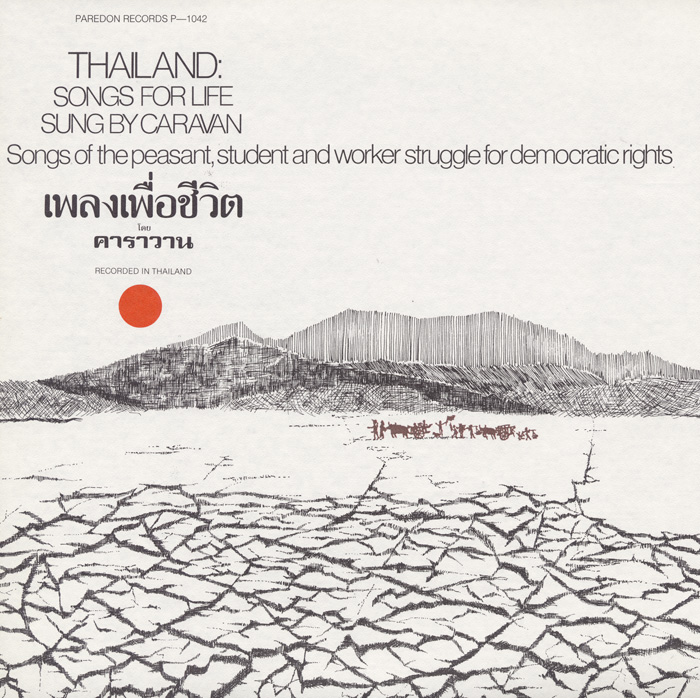
“Man and Buffalo (Kon Gap Kwai)”
from Thailand: Songs for Life (1978) | PAR01042
- Play opening section (0:00-0:54)
- Identify/Describe
- Types of instruments (approx.) or timbres
- Number of vocalists
- Singing style
- Tempo
- Play next section (0:54-2:02)
- Identify/Describe
- Same aspects as above
- Compare/Contrast Sections
- to each other
- to another Thai piece “Admiration of a Sleeping Maiden”
- Introduce/Review “form”
- Call sections “A” and “B”
- Play entire song
- IDENTIFY/DISCUSS Song Structure
- A B (C/“Percussion Bridge”) A’ B’
- Differences between A and A’, B and B’
Assessment:
Are students able to discuss material in an age-appropriate manner? Are students able to compare and contrast sections? Are students able to identify the form?
2. Culture: Thailand (esp. Gov’t. and Protest movements of mid-20th century)
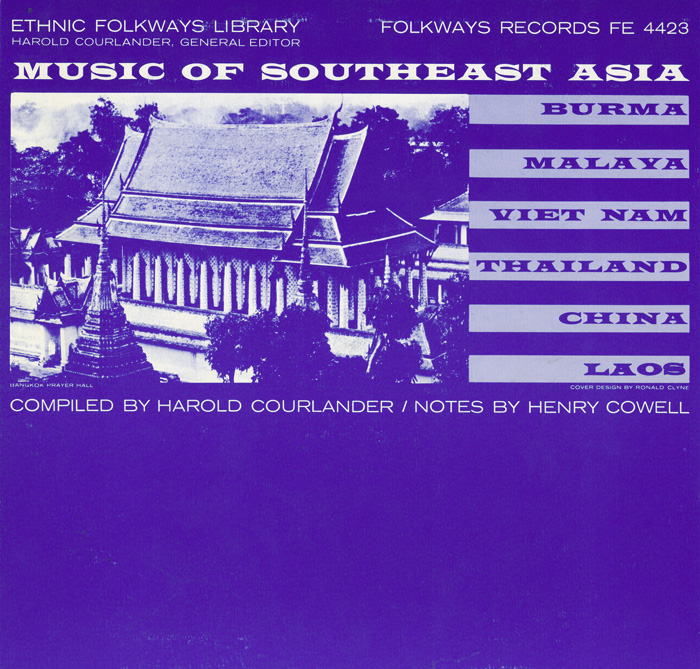
“Thailand: Admiration of a Sleeping Maiden”
from Music of Southeast Asia (1951) | FW04423
- Locate Thailand on a map or globe
- Use Thailand: Caravan: Songs for Life liner notes to gather background on Thai changes of power and Caravan’s key role in the protest movement
- Relate song lyrics of “Man and Buffalo” and other Songs for Life to political and social situation in Thailand at the time
- Explore/Share information on Caravan/Thailand using internet or print material
- Compare the mid-20th century Thai protest movement to the US civil movements (esp. music relating to these movements)
Assessment:
Are students able to discuss the material in an age-appropriate manner and relate Thai civil movements to those of the United States?
3. Perform on Percussion: “Man and Buffalo (Kon Gap Kwai)”
- Tap/Play rhythm instruments (including Orff bass xylophone [A/E]) along with the beat of the B section
- Perform rhythmic ostinati with the B Section (q =88)

- Layer ostinati using different instruments
- Improvise and perform an appropriate ostinato rhythm
- Discuss why these ostinati may not work well in A Sections
- How is the texture different?
- Improvise appropriate rhythmic accompaniments for the A and C Sections
Assessment:
Are students able to keep the steady beat? Are students able to perform rhythmic ostinati? Are students able to improvise appropriate ostinati rhythmic patterns?
4. Perform on Guitar: “Man and Buffalo (Kon Gap Kwai)”
- Listen to B Sections
- Identify significant chord changes (Am to D5)
- Make efforts to stay true to pentatonic (using D5 instead of D, mute B string in Em7/A) and play chord changes with recording
- Use comfortable/learned fingerings if applicable

Guitar Chord Generator by Jim Cranwell Approximately 6,096,384 chords. Official link address for this page.
Assessment:
Are students able to identify and play the chord changes?
5. Perform on Orff: “Man and Buffalo (Kon Gap Kwai)”
- Use A relative minor pentatonic (A C D E G A; same as C pentatonic starting on A)
- Accompany recording using rhythmic ostinati as listed above
- Identify/Perform significant chord changes (Am to D5) in B Section
- Improvise appropriate rhythmic accompaniments for A and C Sections
- Reference other pentatonic pieces of Eastern and Western styles (Amazing Grace, Jesus Loves Me, Ye Banks and Braes o’ Bonnie Doon)
- Discuss facets of the pentatonic scale
- How to construct; traditionally, no half-steps or tritons
- Major and minor pentatonics)
- Improvise a solo over the B Section
- Orff, percussion, and/or guitar accompaniment
Assessment:
Are students able to accompany the recording with rhythmic ostinati and appropriate chord changes? Do students understand the structure of the pentatonic scale? Are students able to improvise over the B section?




